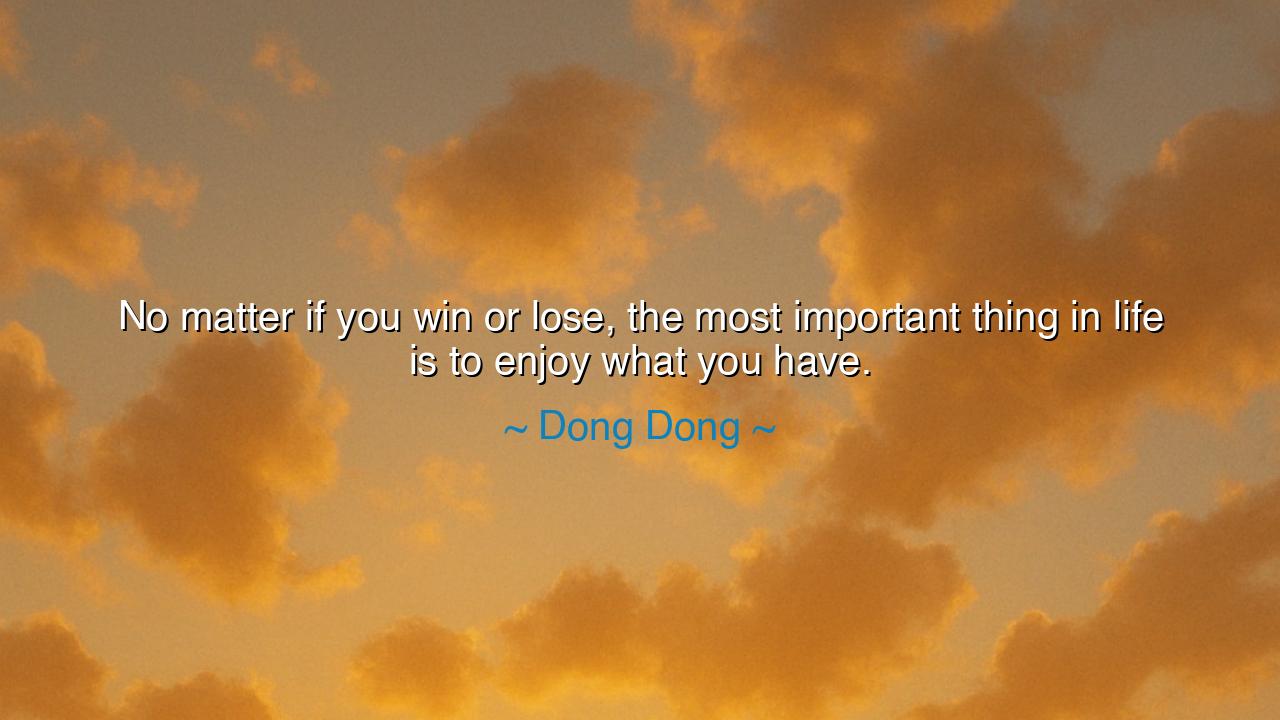
No matter if you win or lose, the most important thing in life is
No matter if you win or lose, the most important thing in life is to enjoy what you have.






In the grand theater of life, we often find ourselves caught in a relentless pursuit of victory—striving for the triumph of winning, of achieving the goals we set before us. Yet, as Dong Dong wisely reminds us, the true essence of life is not found in the fleeting moments of success or failure, but in the quiet appreciation of what we already have. To enjoy life, to savor its small joys and blessings, is to understand that the most important treasure lies not in the outcome of our endeavors, but in the journey itself and in the contentment we cultivate along the way.
Let us think of the great warriors of old, those whose names are etched in the annals of history—not for the victories they won, but for the wisdom they imparted through their lives. Socrates, the philosopher of Athens, was not a man concerned with winning arguments or achieving fame. Rather, he believed that true wisdom lay in the pursuit of knowledge and the joy found in understanding the world around him. Though many sought to best him in debate, Socrates was content not with being proven right, but with the simple act of learning, of living a life rooted in inquiry and reflection. His joy did not come from the victory of being correct, but from the contentment of living according to his principles and finding satisfaction in his intellectual journey.
Consider also the life of Epictetus, a Stoic philosopher who taught the importance of accepting life as it comes. Born into slavery, Epictetus had little to call his own, yet his words resonate through the ages: “It’s not what happens to you, but how you react to it that matters.” He found joy not in the things he lacked or in external circumstances, but in the internal freedom he cultivated—his ability to find peace in the present moment, to enjoy the life he had, regardless of the external world’s tumult. He lived in accordance with virtue, not in pursuit of material wealth or status. In his own humble way, he embodied the essence of Dong Dong’s wisdom—finding joy in the life he led, rather than in chasing distant, elusive victories.
This sentiment echoes in the story of the great poet Rumi, who found his deepest satisfaction not in fame or fortune, but in the simple, pure connection with the divine and with the world around him. His poetry speaks of finding joy in every moment, in every breath, in the beauty of existence itself. Rumi’s life was not filled with the chase for external success, but with a deep contentment in the love and peace he found in the present. His joy came from an awareness that life, in all its forms, was enough—there was no need for anything more. His legacy teaches us that enjoyment is not tied to outcomes, but to an inner state of being at peace with oneself and with the world.
Indeed, the pursuit of enjoyment over victory or loss is a lesson woven into the very fabric of ancient wisdom. The philosopher Laozi, in his Tao Te Ching, spoke of the importance of living in harmony with the Tao, or the natural flow of the universe. To live in such harmony is to find joy not in control or dominance, but in accepting the ebb and flow of life, in embracing the present without clinging to expectations. Laozi teaches that those who find joy in the present moment—who understand that life itself is a gift—are those who live in true peace, unshaken by the storms of fortune.
Dong Dong’s words call us to a similar peace. They remind us that life is not a competition where only the winners matter. Rather, it is a gift—one to be cherished in all its simplicity. Whether we win or lose, whether we succeed or fail, the most important thing is to enjoy the blessings we have, to find joy in the journey, and to remain content with what we are given. This wisdom calls us to embrace gratitude, to focus not on what we lack, but on what we already possess—the love of family, the beauty of nature, the comfort of home, and the peace that comes from within.
So, let us take this wisdom to heart. In our own lives, we should not measure our worth by the number of trophies we collect, nor by the amount of praise we receive. Instead, let us cultivate a life where we can enjoy the present moment, where we can appreciate the simple pleasures of living, and where we find satisfaction in what we have. In doing so, we discover that the truest victory is not in the conquest of external goals, but in the internal peace and contentment that comes from embracing the life we are given, with all its imperfections, joys, and challenges.






AAdministratorAdministrator
Welcome, honored guests. Please leave a comment, we will respond soon